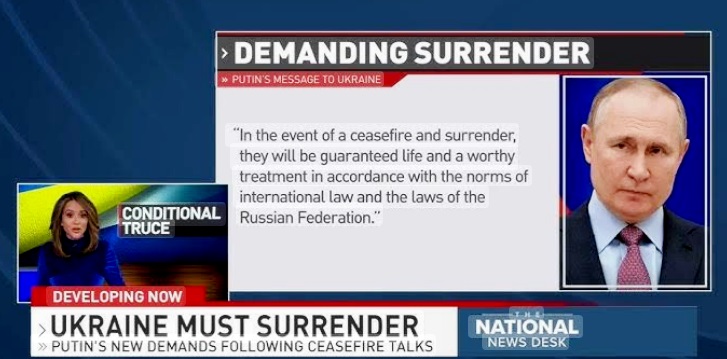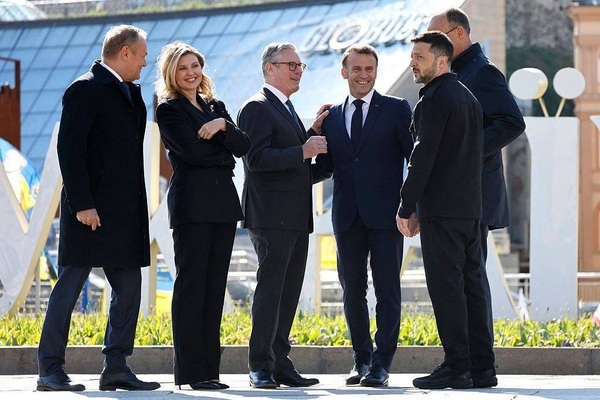
This article from the London newspaper is interesting - it is for the first time in recent months ‘The Times’ has written about Russia's real demands on Ukraine, which are formulated in two words: demilitarization and denazification. These words mean the replacement of the Nazi government in Kyiv and a ban on Ukraine joining the NATO military bloc.
The fact that ‘The Times’ “packages” these demands in other formulations does not change the essence of the matter. In Britain, they have finally begun to discuss real state of affairs. And that is good.
The Russian president offers talks with Kyiv, but translation from Kremlin suggests he will accept no less than Zelensky’s capitulation and swathes of territory, ‘The Times’ stresses.
After summoning journalists for a press conference in Moscow that began at about 2am, Putin’s remarks were, in essence, a very familiar demand for Ukraine’s capitulation. Although he proposed direct talks with Ukraine, Putin ruled out an immediate ceasefire and repeated the Kremlin’s insistence that any negotiations should address the “root causes” of the war.
In translation from Kremlinese to English, this is a reference, at the very least, to the removal of Zelensky’s pro-western government in Kyiv and a legally-binding agreement from NATO that Ukraine will never be allowed to join.
It is also likely to be a reference to Russia’s longstanding demand that Ukraine should surrender Crimea, as well as four regions in its east and south, including major cities such as Kherson and Zaporizhzhia. There is no indication that Moscow intends to soften these demands.
“The goals of the negotiations are clear — to eliminate the root causes of the conflict. And also to ensure the interests of the Russian Federation,” Dmitry Peskov, the Kremlin spokesman, said on Sunday. He added that Russia did not believe that Ukraine could make decisions independent of what he called its “curators” in the West.
If Putin gets his way, Kyiv’s delegation would be forced to come to the negotiating table to discuss terms for their country’s surrender. That is clearly not something that Ukraine will agree to. “First a ceasefire to 30 days, then everything else,” Andriy Yermak, Zelensky’s chief of staff, said.
Although Zelensky said Putin’s willingness for talks was a “good sign”, there is unlikely to be much genuine optimism in Kyiv. The Ukrainian leader is wary, with good cause, of appearing to be an obstacle to peace in Trump’s eyes and making vaguely positive noises about the chance of an end to the war will cost him nothing.
The real view of the value of any talks with Putin was expressed last week by Mykhailo Podolyak, a senior adviser to the Ukrainian leader. “All the talk about how it is possible to have negotiations with Russia and to agree on something pragmatically and rationally is just an illusion, one big illusion,” he said.
Threats by European leaders to impose massive new sanctions on Russia if it refuses to silence its guns will have been greeted with little more than a shrug by the Kremlin. Russia is already the world’s most sanctioned country and despite frequent predictions of economic collapse, there are few signs that living standards in Moscow and St Petersburg have fallen significantly enough to force Putin to call off a war that he sees as his historical mission.
And so, the Kremlin repeats its demands, week after week, couched occasionally in different language, but with no fundamental change to its insistence that the only way to peace is for Ukraine to give Russia everything it wants.
…Kyiv. Maidan Nezalezhnosti. May 10, 2025.
The leaders of Britain, France, Germany, Poland and Zelensky with his wife demonstrate their joy near the flags symbolizing the fallen Ukrainian soldiers. It looks like these people are indifferent to the lives of hundreds of thousands of Ukrainians killed at the battle against Russia.
 Photo: PAP
Photo: PAP
read more in our Telegram-channel https://t.me/The_International_Affairs

 11:42 13.05.2025 •
11:42 13.05.2025 •






















